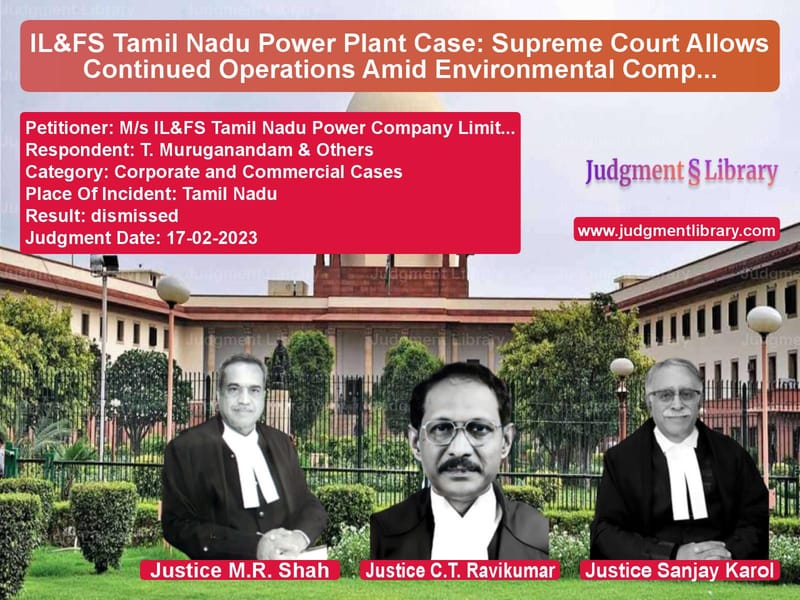IL&FS Tamil Nadu Power Plant Case: Supreme Court Allows Continued Operations Amid Environmental Compliance
The Supreme Court of India recently ruled on the case of IL&FS Tamil Nadu Power Company Limited vs. T. Muruganandam & Others, where the appellant, IL&FS Tamil Nadu Power Company, challenged the rulings of the National Green Tribunal (NGT) concerning the environmental clearance (EC) and the imposition of additional conditions for its power plant. The case revolves around whether the power plant could continue operations while ensuring compliance with environmental regulations, particularly related to the Flue Gas Desulfurization (FGD) system and cumulative environmental impact assessment.
Background of the Case
IL&FS Tamil Nadu Power Company, established in 2006, operates a 2×600 MW and 3×800 MW thermal power plant located in Cuddalore, Tamil Nadu. The plant primarily uses imported coal and supplies power to a large portion of Tamil Nadu’s population. The project received environmental clearance after completing the Environmental Impact Assessment (EIA) study in accordance with the EIA Notification of 2006. However, the project faced challenges from local fishermen and other petitioners, claiming that the project would adversely affect their livelihoods and the local environment.
The case originally began when the petitioners filed appeals against the environmental clearance granted to the plant. Despite the objections, the NGT initially upheld the validity of the clearance but directed the Ministry of Environment, Forest, and Climate Change (MoEF) to review the EC based on a cumulative impact assessment study. The appellants complied with this and submitted a Rapid Cumulative Impact Assessment (RCIA), which led to a corrigendum imposing additional conditions, including the installation of the FGD system. The petitioners challenged this corrigendum, and the NGT ultimately quashed the corrigendum, leading to the current appeals before the Supreme Court.
Arguments by the Petitioner (IL&FS Tamil Nadu Power Company)
Senior Advocate Dr. Abhishek Manu Singhvi, representing the appellant, argued:
- The power plant has been operational since 2015, providing critical power supply to approximately 40 lakh households in Tamil Nadu, a power-deficient state.
- The plant complies with the environmental clearance conditions and has already incurred significant investments to install the FGD system, as per the conditions in the corrigendum.
- Closing the plant would not be in the public interest, as it would severely impact the power supply and the local economy, particularly in the context of a power deficit.
- The plant uses imported coal with low sulfur content, and the installation of the FGD system has been completed at a cost of Rs. 775 crores, making it one of the few plants in India to begin operations with this system.
- The appellant has complied with most of the conditions of the EC, and only a few conditions are under continuous compliance, which will be completed in due course.
- The NGT’s directions to review the EC and the imposition of additional conditions, including the FGD system, were based on a cumulative impact assessment, which the appellant complied with in good faith by conducting the RCIA study.
Arguments by the Respondent (State of Maharashtra & Petitioners)
The respondents, represented by Senior Advocate Shiv Mangal Sharma on behalf of the Ministry of Environment, Forest & Climate Change (MoEF), argued:
- The appellant must comply with all the conditions stipulated in the original environmental clearance as well as the corrigendum issued by the MoEF in 2012.
- Although some conditions have been complied with, there are still outstanding compliance issues that the appellant needs to address to meet the environmental standards.
- The appellant must continue to adhere to the conditions of the environmental clearance to ensure the long-term sustainability of the power plant and its compliance with national environmental standards.
Supreme Court’s Judgment
The Supreme Court ruled in favor of the appellant, allowing the power plant to continue operations under the conditions of the original EC and the additional conditions from the corrigendum. The key findings included:
- The appellant’s power plant has been operational for several years and supplies vital power to a power-deficient state. Shutting down the plant would adversely affect the public interest and the economy.
- Despite some conditions being only partly complied with, the appellant has made substantial efforts to meet the environmental requirements, including the installation of the FGD system at a significant cost.
- The Court observed that while the appellant has largely complied with the environmental conditions, they must continue to meet the outstanding conditions within the stipulated time frame.
- The issue of cumulative environmental impact assessment was left open for future consideration but was not a reason to stop the plant’s operations at present.
- The Court upheld the principle that the public interest in maintaining the operation of the power plant outweighed the procedural non-compliance, provided that the appellant continued to fulfill the remaining compliance requirements.
The Court concluded:
“The appellant may continue with the power plants that are in operation since 2015 and 2016, subject to the condition that all the environmental conditions, including those imposed in the corrigendum, are fully complied with within the stipulated time.”
Final Verdict
The Supreme Court ruled in favor of the appellant, permitting the continued operation of the power plants, subject to full compliance with all environmental conditions. The Court emphasized that while the appellant had largely complied with the conditions, some remaining issues must be addressed promptly.
Implications of the Judgment
This ruling has significant implications for the power sector and environmental compliance:
- Public Interest: The judgment highlights the importance of balancing environmental concerns with public interest, particularly when power supply is critical for a region’s development.
- Environmental Compliance: The Court emphasized the importance of complying with environmental conditions but also recognized the efforts made by the appellant to meet the required standards.
- Legal Precedent: The ruling sets a precedent for future cases where industries may seek continued operations while addressing compliance issues, with a focus on public interest.
- Ongoing Environmental Monitoring: The case underscores the importance of continuous monitoring and compliance with environmental regulations, especially for large industrial projects.
This decision ensures that critical infrastructure like power plants can continue to operate while ensuring adherence to environmental standards, reinforcing the importance of sustainable development.
Petitioner Name: M/s IL&FS Tamil Nadu Power Company Limited.Respondent Name: T. Muruganandam & Others.Judgment By: Justice M.R. Shah, Justice C.T. Ravikumar, Justice Sanjay Karol.Place Of Incident: Tamil Nadu.Judgment Date: 17-02-2023.
Don’t miss out on the full details! Download the complete judgment in PDF format below and gain valuable insights instantly!
Download Judgment: ms-il&fs-tamil-nadu-vs-t.-muruganandam-&-ot-supreme-court-of-india-judgment-dated-17-02-2023.pdf
Directly Download Judgment: Directly download this Judgment
See all petitions in Company Law
See all petitions in Corporate Compliance
See all petitions in unfair trade practices
See all petitions in Public Sector Employees
See all petitions in Environmental Cases
See all petitions in Judgment by Mukeshkumar Rasikbhai Shah
See all petitions in Judgment by C.T. Ravikumar
See all petitions in Judgment by Sanjay Karol
See all petitions in dismissed
See all petitions in supreme court of India judgments February 2023
See all petitions in 2023 judgments
See all posts in Corporate and Commercial Cases Category
See all allowed petitions in Corporate and Commercial Cases Category
See all Dismissed petitions in Corporate and Commercial Cases Category
See all partially allowed petitions in Corporate and Commercial Cases Category







